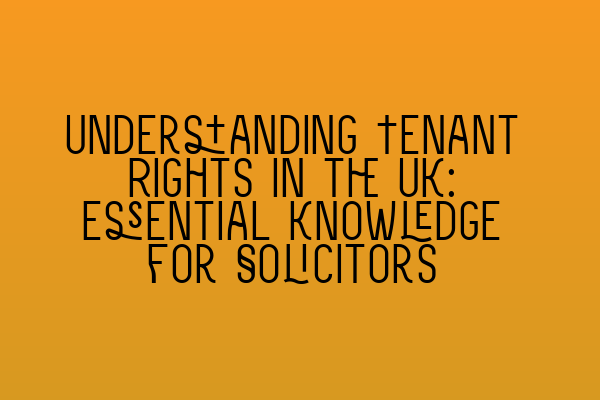Understanding Tenant Rights in the UK: Essential Knowledge for Solicitors
As a solicitor specializing in property law, it is crucial to have a deep understanding of tenant rights in the UK. Whether you are representing landlords or tenants, having a thorough knowledge of these rights will allow you to provide the best legal advice and ensure that your clients’ interests are protected. In this blog post, we will discuss the essential aspects of tenant rights in the UK and provide valuable insights for solicitors practicing in this area.
1. Introduction to Tenant Rights
Tenant rights refer to the legal protections afforded to individuals who rent or lease a property. These rights are designed to ensure fair and reasonable treatment of tenants and to provide a legal framework for resolving disputes or issues that may arise during the tenancy.
2. The Landlord and Tenant Act 1985
The Landlord and Tenant Act 1985 is a fundamental piece of legislation that sets out the key rights and responsibilities of both landlords and tenants in the UK. It covers various aspects of the landlord-tenant relationship, including the provision of basic services, the repair and maintenance of the property, and the eviction process.
3. Right to Quiet Enjoyment
One of the most fundamental tenant rights is the right to quiet enjoyment of the rented property. This means that tenants have the right to live in the property without unreasonable interference from the landlord. Any attempt by the landlord to disturb the tenant’s peace and quiet may constitute a breach of this right.
4. Repairs and Maintenance
Under the Landlord and Tenant Act 1985, landlords are obligated to keep the property in a good state of repair and ensure that it is fit for habitation. If there are any necessary repairs or maintenance works, it is the landlord’s responsibility to carry them out in a timely manner. Failure to do so could result in legal action being taken by the tenant.
5. Deposit Protection
In the UK, landlords are legally required to protect their tenants’ deposits in a government-approved tenancy deposit scheme. This is to safeguard the deposit and ensure its fair return at the end of the tenancy. As a solicitor, it is crucial to advise your clients on the importance of deposit protection and assist them in taking the necessary steps to comply with the legal requirements.
6. Eviction Process
In the unfortunate event that a landlord wishes to terminate a tenancy, there are specific procedures that must be followed. These procedures are set out in the Housing Act 1988 and often require the issuance of a formal notice to the tenant. As a solicitor, you play a vital role in guiding your clients through the eviction process and ensuring that their actions are legal and compliant with the law.
7. Discrimination and Harassment
Tenant rights also encompass protection against discrimination and harassment. The Equality Act 2010 prohibits landlords from unlawfully discriminating against tenants on the grounds of age, gender, disability, religion, or other protected characteristics. It is crucial for solicitors to be well-versed in this area of law and assist clients in asserting their rights.
8. Tenancy Agreements
Tenancy agreements are legally binding contracts between landlords and tenants. These agreements set out the terms and conditions of the tenancy, including rent, duration, and responsibilities of both parties. As a solicitor, it is essential to review and advise your clients on the contents of these agreements to ensure that their rights are adequately protected.
9. Additional Tenant Rights
In addition to the rights mentioned above, there are numerous other rights that tenants may have depending on their specific circumstances. These rights may include access to communal facilities, protection against unfair rent increases, and the right to challenge substandard housing conditions. As a solicitor, it is vital to familiarize yourself with the broader range of tenant rights to provide comprehensive legal advice.
10. Conclusion
Understanding tenant rights is an essential aspect of being a successful property law solicitor in the UK. By having a thorough understanding of the legal framework surrounding tenant rights, you can effectively represent your clients and help them navigate through any legal issues that may arise during their tenancy. It is vital to keep abreast of any changes or updates to relevant legislation to ensure that you are providing accurate and up-to-date advice.
To learn more about related topics, check out these articles:
– 41. Test Centers for SQE: Convenient Locations for the Exam
– 39. Skills Assessed in SQE: Understanding the Exam Content
– 40. Interviewing in SQE: Mastering the Assessment Process
– 42. SRA Requirements: Meeting the Standards for SQE Qualification
– 22. Balancing Work and SQE Prep: Strategies for Success
At SQE Property Law & Land Law, we are committed to providing valuable insights and expert advice to solicitors across various areas of law. Stay tuned for more informative blog posts and resources to enhance your legal knowledge and skills.
